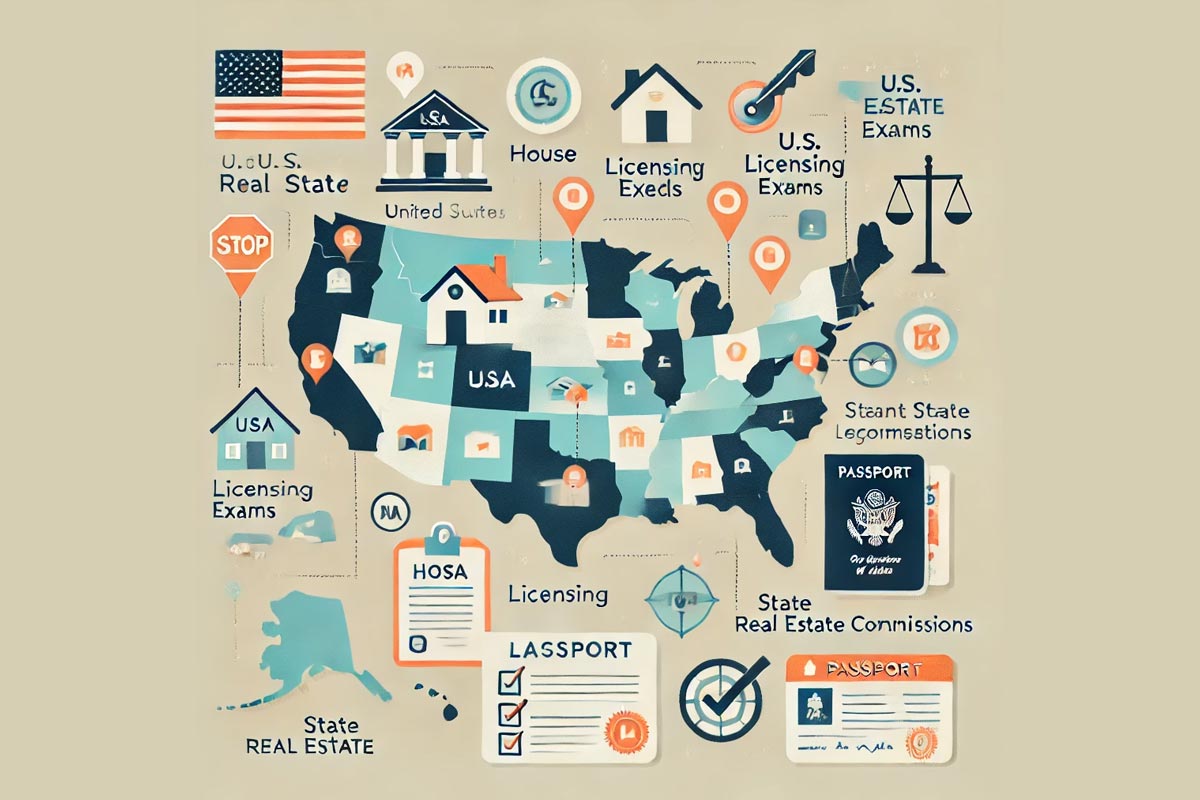
For many international real estate students, pursuing a career in the U.S. real estate market can be a stepping stone to long-term professional success. Whether you’re aiming to earn your real estate license or simply want to broaden your industry knowledge, studying in a U.S. real estate school offers a unique opportunity to learn best practices, gain exposure to complex regulations, and connect with invaluable professional networks. However, before you dive in, it’s essential to understand the requirements and potential challenges to maximize your educational experience.
Below, I break down critical considerations—ranging from visa requirements to cultural nuances—and offer concrete examples, reputable resources, and practical tips to help foreign students earn their real estate license and thrive in the U.S. market.
Navigating Immigration Status:
Before enrolling in a real estate education program in the United States, your first step should be confirming your immigration status and visa eligibility. Most University based international students attend University on a valid student visa (F-1 or M-1), which allows for full-time study at a recognized institution. Keep in mind, however, that certain states have specific eligibility criteria for licensing. For instance, some states may require that candidates be U.S. citizens or permanent residents, while others—like Florida or Texas—allow non-residents to apply but may require additional documentation of lawful presence.
Coordinating With Authorities:
It’s wise to consult both U.S. immigration authorities and the licensing board of the state where you plan to practice. For immigration resources, visit the U.S. Citizenship and Immigration Services (USCIS) website. For state-specific licensing requirements, check each state’s real estate commission or board. For example, prospective licensees in California can find information at the California Department of Real Estate (DRE). By verifying these details early, you’ll reduce surprises and streamline your path to a license.
Meeting English Language Requirements:
Real estate coursework in the U.S. is primarily taught in English, and proficiency is critical for passing real estate exams and understanding industry jargon. Strengthening your English skills—particularly real estate terminology related to escrow, mortgage underwriting, and zoning—is essential.

Adapting Communication Styles:
Cultural nuances extend beyond language proficiency. Understanding American business etiquette, negotiation styles, and client expectations can enhance your effectiveness as a real estate professional. For example, straightforward communication, punctuality, and direct eye contact are often valued in U.S. business settings. Familiarizing yourself with local customs—such as the appropriate use of personal space, acceptable gift-giving practices, or how to address clients formally and informally—can help build trust and credibility.
Embracing Diversity:
The U.S. real estate industry is shaped by buyers, sellers, and investors from diverse backgrounds. Being sensitive to cultural differences—whether related to decision-making processes, family involvement, or religious considerations—can help you better serve a broad range of clients. Seek out cultural awareness workshops, or talk with mentors from various communities to understand common preferences and communication norms.
State-by-State Differences:
Real estate is regulated primarily at the state level, resulting in a patchwork of laws and licensing requirements. For example, New York’s continuing education rules differ significantly from those in Georgia or Washington State. Understanding local landlord-tenant statutes, disclosure obligations, environmental regulations, and other property-related laws is vital. The National Association of Realtors (NAR) and state real estate associations are excellent starting points for guidance and educational resources.
Federal Guidelines and Industry Ethics:
In addition to state-level rules, you’ll need to understand federal fair housing laws and anti-discrimination measures enforced by agencies such as the U.S. Department of Housing and Urban Development (HUD). Ethical standards, largely shaped by professional associations, promote consumer protection and industry integrity. Familiarizing yourself with these regulations ensures you serve your clients fairly and ethically.
Evaluating Foreign Credentials:
If you have a real estate-related degree or license from abroad, consider having your credentials evaluated by a recognized organization. Services like World Education Services (WES) or Educational Credential Evaluators (ECE) can review your transcripts and equate them to U.S. standards. While this may not exempt you from state pre-licensing courses, it can streamline the admissions process for certain schools or programs.
Examples of State Reciprocity Agreements:
Some states have reciprocity agreements allowing currently licensed agents from certain jurisdictions to bypass parts of the licensing process. To find out if reciprocity applies to you, consult your target state’s real estate commission—such as the Florida Real Estate Commission (FREC) —for up-to-date information on reciprocity agreements.

Networking and Mentorship:
Building relationships is key to success in real estate. Attend local chapter meetings of organizations like the Asian Real Estate Association of America (AREAA) or ethnic-based real estate groups that welcome diversity. Seeking a mentor—perhaps through alumni networks or real estate professionals in your community—can provide valuable insights, career guidance, and introductions to potential employers.
Hands-On Experience:
Internships, job shadowing, or part-time roles at real estate brokerages help reinforce what you learn in class. By applying classroom concepts in real-world scenarios, you’ll develop confidence, sharpen communication skills, and gain critical exposure to the daily operations of a real estate office.
Hands-On Experience:
The U.S. real estate landscape evolves rapidly due to changing market trends, emerging technologies, and new regulations. Staying current might involve obtaining additional certifications, such as Accredited Buyer’s Representative (ABR®) or Certified International Property Specialist (CIPS), both offered by NAR. These designations can distinguish you from other foreign students seeking a U.S. real estate license and demonstrate your commitment to professional growth.
For those looking to study in real estate school USA programs, the journey is both challenging and rewarding. By understanding visa requirements, honing language and cultural competency, mastering U.S. property law, and being strategic about credential evaluation and reciprocity, international real estate students can confidently navigate the licensing process. With dedication, adaptability, and cultural sensitivity, foreign students can thrive and build a successful career in the diverse and dynamic U.S. real estate industry.
Love,
Kartik
Why DRE Accreditation Matters More Than Online Reviews
Identification Requirements for the CA Exam
What to Bring to the California Real Estate Exam: Your Essential Checklist

Founder, Adhi Schools
Kartik Subramaniam is the Founder and CEO of ADHI Real Estate Schools, a leader in real estate education throughout California. Holding a degree from Cal Poly University, Subramaniam brings a wealth of experience in real estate sales, property management, and investment transactions. He is the author of nine books on real estate and countless real estate articles. With a track record of successfully completing hundreds of real estate transactions, he has equipped countless professionals to thrive in the industry.